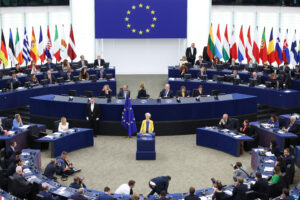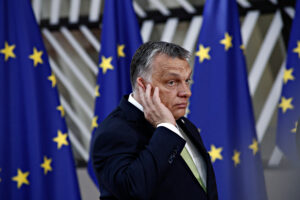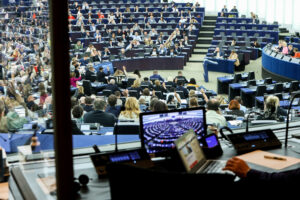Tom Theuns, assistant professor of Political Theory and European Politics, on how the European Union deals with democratic backsliding.

Dr. Tom Theuns is assistant professor of Political Theory and European Politics at the Institute of Political Science of Leiden University in the Netherlands.
He also serves as associate researcher at the Centre for European Studies and Comparative Politics at Sciences Po Paris.
Alongside his academic work, Dr. Theuns is also a frequent commentator on European political affairs for EUobserver, Euractiv, Euronews and Le Monde Diplomatique.
He tweets @TomTheuns
This is part one of the interview. Part two will be published shortly.
(C) EU WATCH 2022
Dr. Theuns, there is criticism from certain member states that the EU is overstepping the powers and competencies vested in it by the treaties. Others argue the exact opposite and say the EU is not making use of all of its powers. What is your view?
The truth is: Both are correct. The EU is an institution that was created by member states to further their interests. And so far it has acted extremely rarely against the interests of the member states. At the same time, there have been moments when certain procedures have perhaps pulled more sovereignty than initially intended to the European level and away from the member states. If we take a closer look though, those moments are often in fact driven by two dynamics: one is the dynamic of self-interest: that member states can better achieve their goals through further cooperation. And the second aspect is that, domestically, it can be very convenient to have an EU on which you can blame things.
The European Parliament has pressured the Commission to act against Hungary and Poland. Has Parliament become the driver for closer integration?
Irrespective of the substance of this conflict, members of the European Parliament, parties and political groups have often gained from playing up tensions between the EU institutions and member states. Institutionally, the European Parliament is, at best, the weaker half of a bicameral system. We like to think that it is more than that. Yet its actual legal powers are limited. Take the Article 7 procedure as an example: Parliament can ask for action, yes, but has little say in how this procedure then plays out.

State of the Union Address 2022 by Ursula von der Leyen, President of the European Commission. Photo: Christophe Licoppe/© European Union 2022
What will be the likely outcome of the Article 7 infringement procedure? Does the Commission have the necessary tools to act?
The outcome of the Article 7 process is not going to successful. And no, the European Commission does not have the necessary powers, nor does it possess the will to act decisively. Article 7 has been interpreted by the Commission’s Legal Service as being the only legitimate mechanism by which member states can be sanctioned. However, Article 7 requires unanimity. Every state except the one under consideration must agree that there is a violation of fundamental values. So, the possibility that sanctions are imposed is extremely unlikely.
In other words, the European Parliament’s adoption of a resolution declaring that Hungary is now an “electoral autocracy” was a symbolic, but essentially useless exercise?
Symbols are not useless! True, the resolution has no legal effect, but let’s imagine it had. Let’s imagine it would be applied in practice. Article 10 of the Treaty on the European Union stipulates that EU member states need to be representative democracies. And the European Parliament says that Hungary isn’t one anymore, a statement I agree with. We have a deep paradox here: the absence of democratic governance in Hungary should have far-reaching implications for EU decision-making and yet, it does not. You have a member state that is not a democracy but retains its voting rights in the Council.
Hungary has denounced the EU action against it as some kind of foreign intervention…
The rhetoric from Fidesz and Viktor Orbán that they have legitimacy because they have been elected and re-elected four times and that EU elites have no legitimacy is misguided. Orbán has systematically dismantled democracy in Hungary, to the extent that we can no longer consider elections there as fair. They are still free, but not fair. For example, Orbán’s Fidesz dominates the media sphere almost totally. They control every daily regional newspaper in Hungary! Orbán uses this media dominance to spread pro-government propaganda and to vilify opponents. So, Orbán’s own democratic mandate is deeply questionable.

Viktor Orban, Hungary’s prime minister arrives for a meeting with European Union leaders in Brussels, Belgium on Jun. 22, 2017. Shutterstock/Alexandros Michailidis.
Could the European Council exclude Viktor Orbán from its midst?
There have been some proposals from academics on how to address this matter, but in essence, they are all extremely creative solutions. There is no exclusion mechanism in the EU treaties, like you have for example at the Council of Europe, where Russia was recently expelled. However, if we tolerate autocratic states inside the EU, we jeopardize the democratic character of EU decision-making. This is because, in essence, we then pool sovereignty with countries that are no longer democratic. In other words: decision-making of the EU, legislation and policy which affects all European citizens, is tainted by the active participation of autocratic actors in the processes. So, it is vital that autocratic governments are excluded from EU decision-making.
How can this be practically accomplished?
It is a very difficult situation, there are no perfect options in this context. But pro-democratic member states need to ask themselves what is important to them. Can they really accept a supranational union with autocratic states?
If they cannot, I think there are two main options available to them. The first one is to reduce EU’s complicity in the processes of democratic backsliding, for example, by cutting EU funding to authoritarian governments. Secondly, they can try to contain the autocrats’ influence on EU lawmaking. This means either reducing the level of EU integration or reducing the number of EU member states. This may sound radical, but in my opinion, it is even more radical to accept the idea of a union with autocratic states. Some say the way forward would be more federalisation in order to create a more powerful EU executive. But I think this is neither politically feasible nor desirable given widespread resistance to the idea of a European superstate.

Voting during the plenary session of the European Parliament Plenary session on 15 September 2022. Fred MARVAUX/© European Union 2022 – Source : EP.
Is withholding EU money the only way to progress on the issue of democracy and the rule of law?
It is correct that the so-called conditionality mechanism seems to be the only thing that really generates a strong reaction from authoritarian governments. But a focus on budget conditionality alone is misguided, and the way it has been implemented is weak. Take the recent move by the Commission to withhold EU funds from Hungary. What the Commission has done, in fact, is to create a rather formalistic, technocratic checklist of several reforms that needed to take place before unlocking funds. And now, it seems that the Commission is open to accepting rather formalistic reforms on the part of Hungary. Overall, my conclusion is that using the EU budget is not a very effective way to trigger democratic progress. We need to also think much more about how to support pro-democratic and civil society actors in countries like Hungary and Poland.
Does that mean we are moving away from the famous goal of “ever closer union”?
In academic circles, we often use the term “failing forward” to describe the EU. What this means is that when there is a crisis, there is further integration as a way to respond to the crisis. That was the situation with the corona pandemic, for example. Overall, I don’t think we will be heading towards an “ever closer union” for the time being. And anyway, the vision of a unidirectional, predetermined path toward further integration that cannot be altered has always been a highly utopian idea. While the goal is lofty, perhaps we could even call it an anti-political or anti-democratic idea.
The interview was conducted by Michael Thaidigsmann and Nenad Jurdana.





